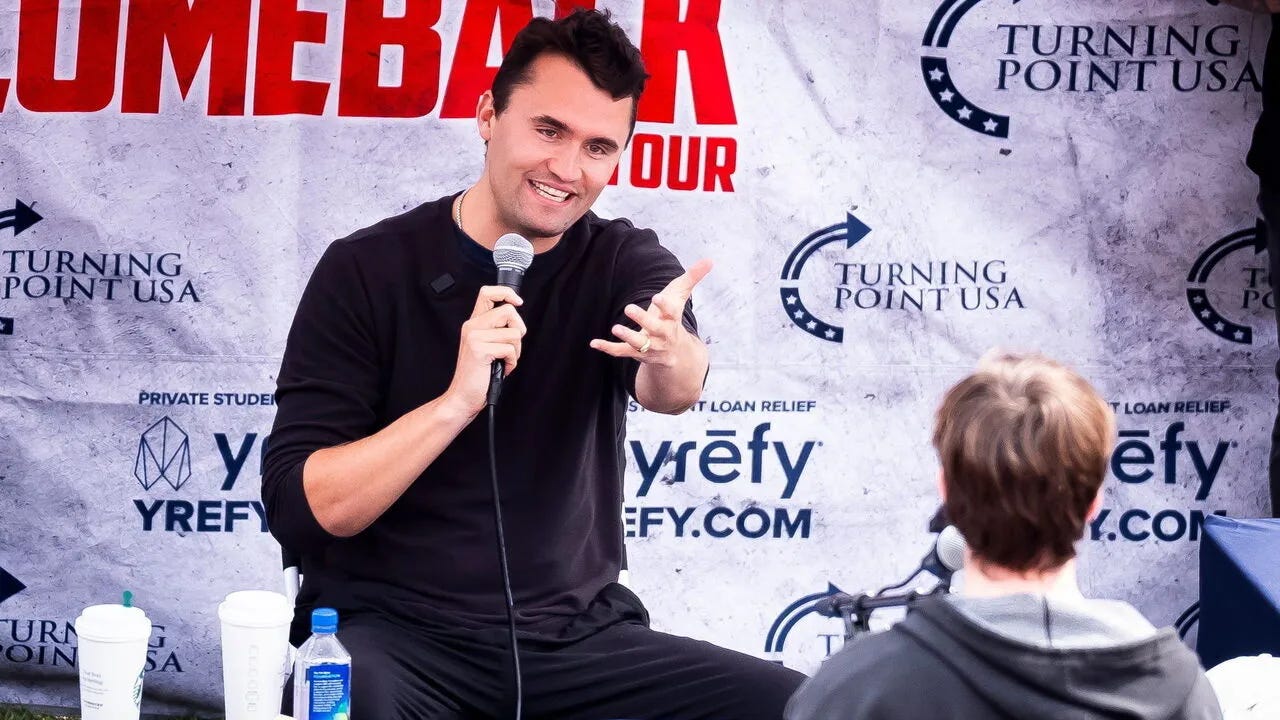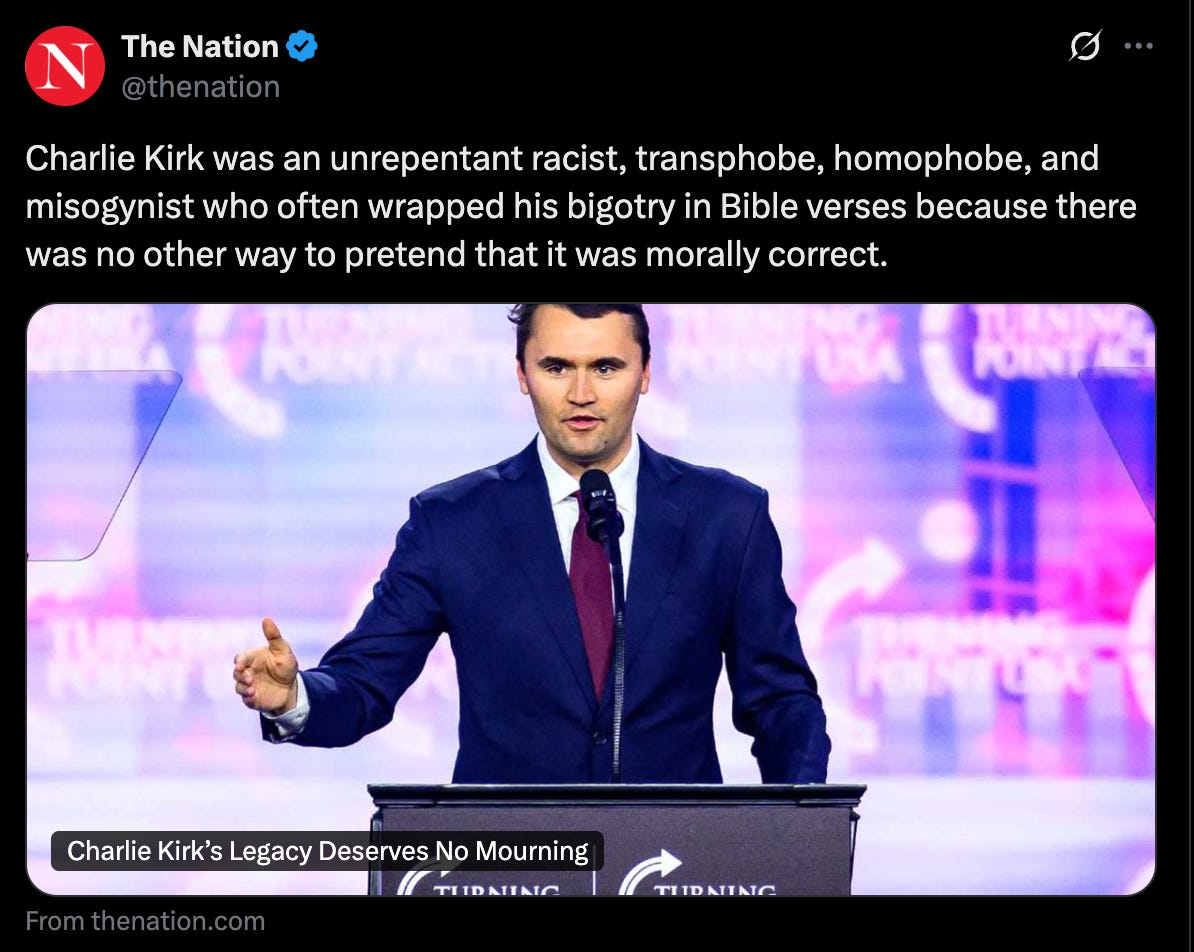The Death of Debate: What Charlie Kirk’s Assassination Reveals About Our Culture
When Truth Is Met with Bullets Instead of Arguments
Charlie Kirk’s assassination at a university event has ripped open already raw national conversations about politics, speech, and moral responsibility. In the hours after the shot, Americans watched in horror as a familiar pattern repeated itself: an act of political violence, immediate polarisation, and a scramble for narratives that confirmed people’s worst fears about “the other side.” The facts are now clear: Kirk was killed while speaking at Utah Valley University, and a suspect has been arrested as investigators continue their work.
This tragedy resonates on both a profoundly personal and a deeply symbolic level. On the personal front, it signifies the irrevocable loss of a human life. A devoted husband, a loving father, a valued colleague. Symbolically, it compels us to confront the essential questions that underpin democracy itself: How should we engage with our political adversaries? Where lies the boundary between vigorous critique and outright delegitimisation? And what corrosive effects might inflammatory political rhetoric exert on the societal fabric, potentially nurturing the seeds of violence?
When Charlie Kirk was murdered, America did not just lose a political polemicist, it lost one of the last major figures still willing to take his opponents seriously enough to engage them. Kirk’s method was not primarily to shout slogans, but to allow logic and rationale to shine through: campus Q&As, public debates, open forums. He was convinced that persuasion was possible, that democracy still depended on speech, and that truth could still be defended in the marketplace of ideas. I am reminded of the words of the Protestant pastor Charles Spurgeon (often mis-attributed to St. Augustine:
“Let the pure Gospel go forth in all its lion-like majesty and it will soon clear its own way and ease itself of its adversaries.”
This is why his death is doubly tragic. It silenced a man whose weapon of choice was argument, and it exposes a culture increasingly content to replace argument with denunciation, cancellation, or even violence.
I cannot help but recall my great hero St. Edmund Campion, who, after his arrest was subjected to the rack, a brutal torture device that stretched the body. Even though he suffered this two or three times over the following months, he was compelled to participate in four public disputations (or conferences) with Anglican theologians on September 1, 18, 23, and 27, 1581. These debates addressed key theological challenges raised in his earlier writings, such as his famous Decem Rationes (Ten Reasons). Remarkably, even without preparation time, access to books, or recovery from his injuries, which left him physically weakened, Campion performed with such clarity, poise, and intellectual rigour that contemporary accounts describe him as refuting his opponents brilliantly and conducting himself "so easily and readily" that spectators anticipated his acquittal. Like Campion, Charlie was so confident in his beliefs, he was confident enough to debate with all comers without fear.
The dangerous contrast
Now consider, for example, The Nation’s immediate response: “Charlie Kirk was an unrepentant racist, transphobe, homophobe, and misogynist who often wrapped his bigotry in Bible verses because there was no other way to pretend that it was morally correct.”
This is not argument; it is dismissal. It does not ask, “Are his claims true?” It declares him hateful by definition, and by doing so, it instructs its readers that millions of Americans who share Kirk’s concerns are beyond dialogue.
This is precisely the cultural move that Pope Benedict XVI warned against when he spoke of a dictatorship of relativism, a climate where objective truth is denied, yet dissent from dominant ideologies is treated as intolerable.
Okay, Kirk could be blunt, and his rhetoric was sometimes sharp. But what distinguished him was a willingness to meet people in debate. He believed that persuasion was possible, even if difficult. His detractors, however, increasingly act as if persuasion is not only impossible but unnecessary: those who differ must be silenced, not reasoned with.
The genealogy of a crisis
How did we get here? The answer is both philosophical and theological.
The Renaissance was born of a religious humanism. Its great figures — Brunelleschi, Ghiberti, Michelangelo, Leonardo, celebrated human dignity precisely because it reflected divine glory. Giovanni Pico della Mirandola, in his Oration on the Dignity of Man (1486), wrote:
“To man it is granted to have whatever he chooses, to be whatever he wills. The Father placed man at the centre of the world… to fashion himself in the form he prefers. He can degenerate into the lower forms of life, or be reborn into the higher, divine forms.”
This was not license for self-invention without limits; it was an exalted vision of freedom as the path to virtue, creativity, and holiness. Renaissance humanism saw no contradiction between faith and reason, between science and art, between liberty and truth.
But with the Enlightenment, that synthesis began to fray. Reason detached from revelation. Philosophers dreamed of liberty, equality, fraternity, but without God, indeed, often in direct conflict with God: A quote that illustrates this sentiment, linking human freedom to the elimination of both monarchical and religious tyranny, comes from Denis Diderot's 1772 poem Les Éleuthéromanes (The Freedom Maniacs): "And his hands would plait the priest's entrails, / For want of a cord, to strangle kings." As in Babel, humanity tried to build unity on its own terms, convinced of its power to remake the world. What followed was not harmony but fracture, violence, and confusion.
The twentieth century radicalised this trajectory. Post-structuralists like Michel Foucault reduced morality to structures of power; Jacques Derrida deconstructed language and truth; Gilles Deleuze dismantled identity itself. If truth is only a construct, then nothing is fixed, not even biological sex. In such a world, the human person is no longer a gift but a project, subject to constant reinvention.
Benedict XVI diagnosed the result with prophetic clarity:
“We are moving towards a dictatorship of relativism which does not recognise anything as definitive and whose ultimate goal consists solely of one’s own ego and desires.” (Homily before the 2005 Conclave)
When truth is denied, what remains is power. When conscience is detached from God, the strong impose their will on the weak.
Moral inversion in our culture
That is why so many of our cultural battles feel upside down. Abortion, the deliberate killing of unborn children, is not merely tolerated by many in power but proclaimed by many as a positive good. Gender ideology, which promotes a harmful dualism, severing the intrinsic unity between body and soul as created by God, while denying the natural, binary complementarity of male and female as part of the divine order, is defended as liberation even as it leaves young people scarred for life. Marriage and family, once seen as the bedrock of civilisation, are denigrated as oppressive constructs.
What once seemed obviously evil is reframed as justice. What once was clearly good; life, family, truth, is denounced as bigotry. And in this atmosphere, even violence against a political opponent can be excused or understood or, it seems, even considered a good by some, because once truth itself is relative, silencing the “dangerous” voice becomes an act of virtue.
A false political binary
Too often, the American conversation is framed as a binary: Democrats as compassionate defenders of the poor and the stranger, Republicans as greedy defenders of wealth and guns. This caricature does enormous damage.





